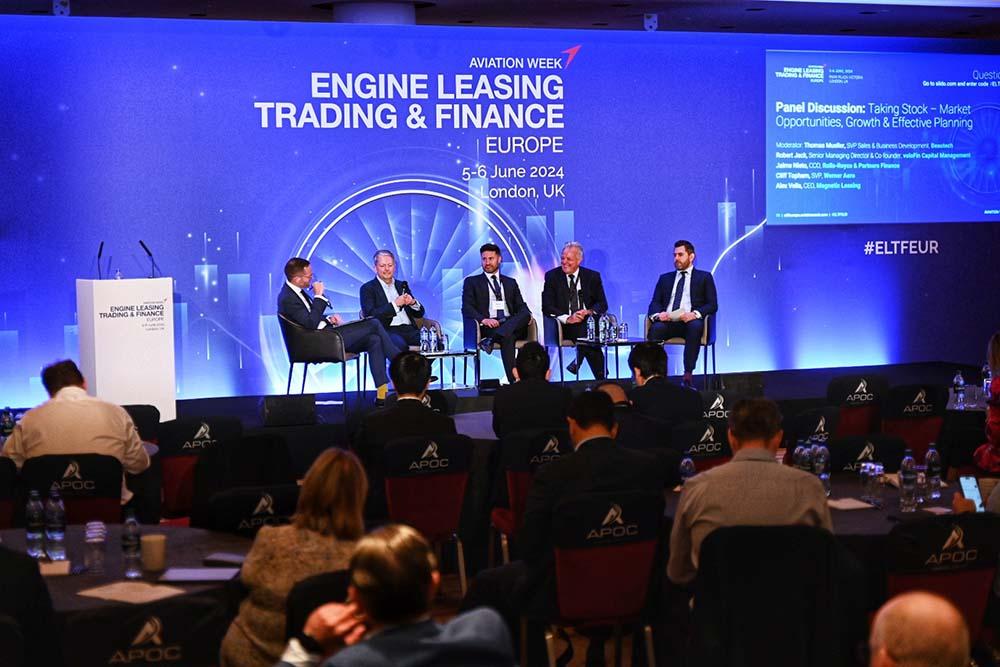
Left to right: Thomas Mueller, SVP sales and business development EMEA, BeauTech; Robert Jack, senior managing director and cofounder of volofin Capital Management; Jaime Nieto, CCO of Rolls-Royce and Partners Finance; Cliff Topham, SVP of Werner Aero Services; and Alex Vella, CEO of Magnetic Leasing.
LONDON— Despite sky-high lease rates and surging demand for CFM International CFM56 and IAE V2500 engines, it would pay for lessors of current-generation equipment to be a little more “paranoid,” the CEO of Lithuania-based Magnetic Leasing, Alex Vella, told delegates at the Aviation Week Network’s Engine Leasing Trading and Finance Europe conference.
“Everyone agrees the current levels are not sustainable, so we are heading at some point in the medium-term future for a big downturn,” he said.
Vella was speaking after a presentation from Shanith de Mel, aviation manager at consultancy ICF, which showed that CFM56-7B and -5B lease rates had risen 67% and 50%, respectively, in the past two years.
De Mel also noted that demand for the V2500 was even higher than for the -5B—its competitor engine on the Airbus A320—due to a smaller overall fleet size for Pratt & Whitney engines and the impact of the groundings of its successor, the PW1100G.
“There is going to be a correction; airlines are not going to be able to keep paying the lease rates that are being commanded from the lessors,” said Vella.
Sitting on the panel discussion with Vella, Cliff Topham, senior vice president at Werner Aero, acknowledged that “lease rates are in fantasy land,” adding that the exceptional reliability and predictability of CFM56 and V2500 equipment had laid the foundations for the growth of the engine leasing market.
This was acknowledged by fellow panelist Robert Jack, senior managing director and cofounder of lender Volofin Capital Management, who said that financiers are now more confident about lending into the engine leasing market, having been somewhat “fearful” about it in the past.
However, Jack said that lenders needed to offer flexibility to help engine lessors navigate the challenges of the MRO market. For example, this might mean allowing an engine to be placed with a more challenging credit for a period to utilize any remaining green time.
Other engine movements were highlighted by Vella to demonstrate the scale of current demand—for example, he has experienced instances of airlines parking narrowbody freighter aircraft in order to use the engines for their passenger operations.
Fellow panelist Jaime Nieto, chief commercial officer for Rolls-Royce & Partners Finance, forecast that strong demand for spare engines will continue for 3-4 years due to new aircraft production challenges at the OEMs and ongoing supply chain disruption. “You can’t flip and switch and fix the supply chain,” he said.
An audience poll agreed, with more attendees predicting that the current supply-demand imbalance would continue for 3-4 years rather than 1-2 years.
However, Vella cautioned that lessors should pay more attention to their portfolio composition, balancing mix, credits and time horizons to ensure they are not caught out when the good times end. For example, he said Magnetic would prefer to accept a lower lease rate if it ensured a long-term lease deal with a good credit.
Nieto, meanwhile, noted that Rolls-Royce & Partners Finance was facing its normal end-of-lease window, with about a quarter of its on-lease engine portfolio up for renegotiation this year.





